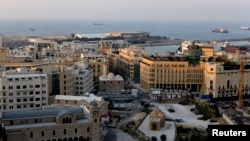Fleeing persecution from the Syrian regime, Majd had to plan very carefully before seeking refuge in a country determined to keep him out.
“I had to leave, it was unsafe for me, there was war and I suffered there,” explained the 22-year-old of his time in Syria. “So I had to cross into Lebanon illegally.”
In January, the Lebanese government effectively closed the door to Syrians escaping the war, ending a long-standing open border policy between the two countries.
Since then, the clampdown has continued, with the UNHCR ceasing to register new refugees in line with government demands.
But with the war continuing, Syrians like Majd are still seeking a way in — and some are questioning if the tougher stance is not just damaging to refugees, but Lebanon itself.
Playing a role
It took half-a-year of planning before Majd made his successful crossing into Lebanon last month.
Having saved up and researched options, he posed as a tourist visiting Lebanon for a music concert, complete with hotel booking and the $1,000 he needed to carry with him to convince border control he was not destitute.
“I was given this,” he says, brandishing a small, flimsy piece of paper stating his temporary right to remain in the country.
“It was for one day, but the next day I was illegal.”
Having an impact
According to Ministry of Social Affairs advisor Hala Helou, with refugees making up more than a quarter of the population, the moves were necessary and are having the desired impact.
“With funding [to help Lebanon accommodate refugees] decreasing, we were already overpopulated and couldn’t take any more. Now the number of refugees is not increasing.”
According to one NGO worker who did not want to be identified, eight months since the entry restrictions took effect and Syrians continue to head to Lebanon.
“People are still arriving” said the worker, whose job involves a number of the refugee settlements across Lebanon.
“I see them coming every day, but they are not treated well — many are treated like animals.”
And while Majd was able to produce enough cash to make him appear a credible tourist, for others such a figure is well out of reach.
As a result, they evade the border controls.
“Many have to cross unofficially, often over mountains. I’ve heard of people dying making the journey,” the NGO worker said.
Left disappointed
Those who make it hoping to gain assistance from the U.N. are left disappointed.
Without the safety not of the UNHCR, many are left without options.
“Without this registration there’s not the access to support — this is the problem,” explained Julia Herzog Schmidt of The Norwegian Refugee Council. “They have limited access to services including health, livelihood or formal education.”
UNHCR Lebanon representative Mireille Girard says efforts are ongoing to work with the government on a "humanitarian exception" clause to the new rules which allows refugees access in certain circumstances.
There is continued concern that the tougher measures also could drive refugees to seek ever more desperate ways of leaving Lebanon.
Just this month the International Organization for Migration reported that more than 2,000 migrants have died crossing the Mediterranean for Europe.
Losing track
Some are also questioning whether the harsher rules are proving to be counterproductive for Lebanon.
There have been a number of cases of refugee settlements being raided by state security forces amid concerns of militant infiltration among refugees.
George Ghali, a program officer at Lebanese human rights NGO Alef, claims in creating a situation where refugees are “forced to go underground” the state risks losing track of them.
“When there are people you can’t account for, those whose presence you cannot see and who have gone off-radar — well, this is not a strategic position to be in,” he said.
People will continue to find unofficial paths into Lebanon, said Ministry of Social Affairs advisor Hala Helou. She encourages Syrians who have entered illegally to approach state security with a view to securing official permission.
But though Majd, like the vast majority of refugees, poses no security threat, for him, approaching the authorities is unthinkable.
Fearful of being apprehended at a checkpoint and unable to benefit from the assistance that UNHCR could offer, he is one of an unknown number who have decided to stay off-radar.
“This is a stressful lifestyle, it is not good,” he said. “I need freedom. No one wants to be illegal in any country.”
*Majd’s name has been changed to protect his identity.




